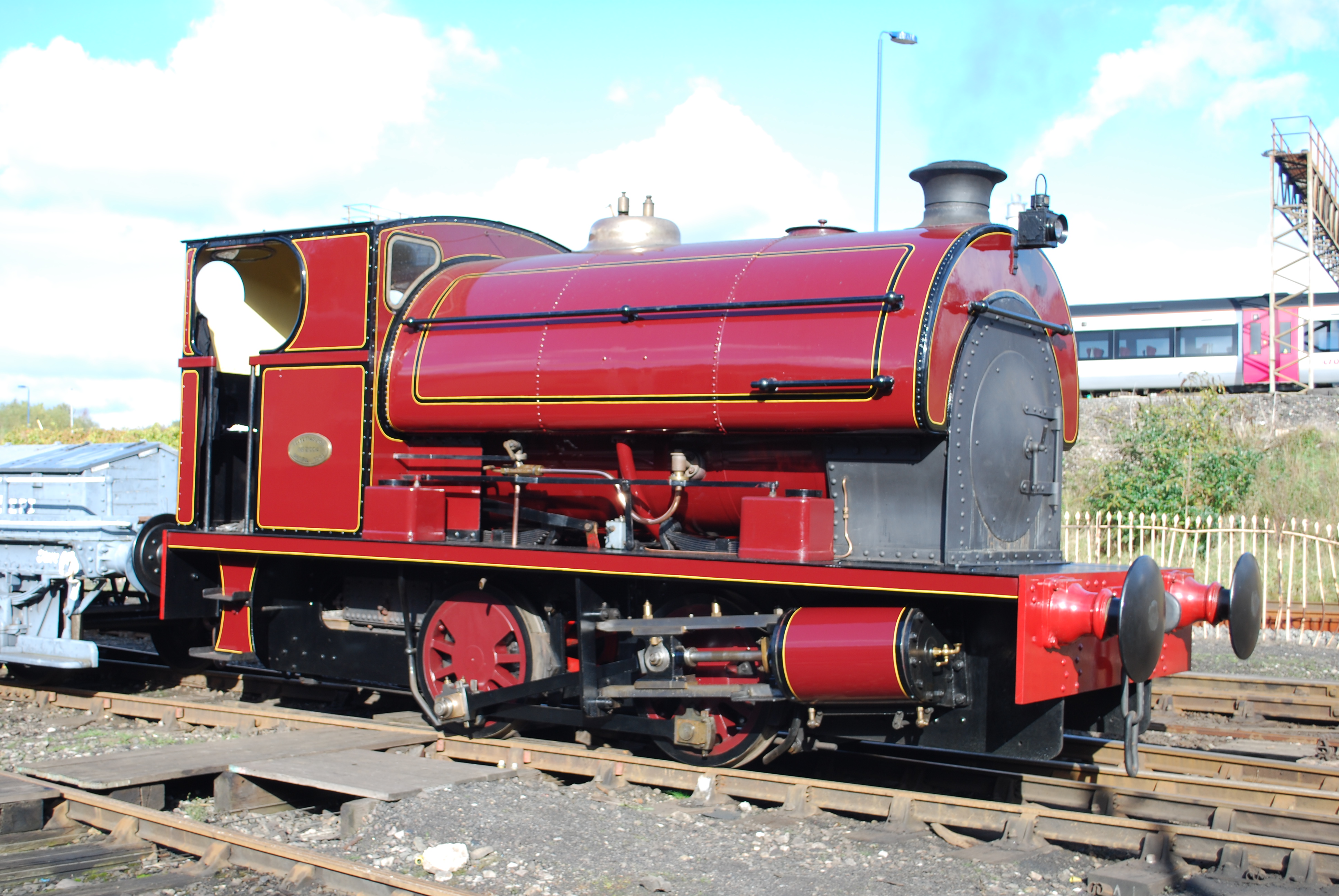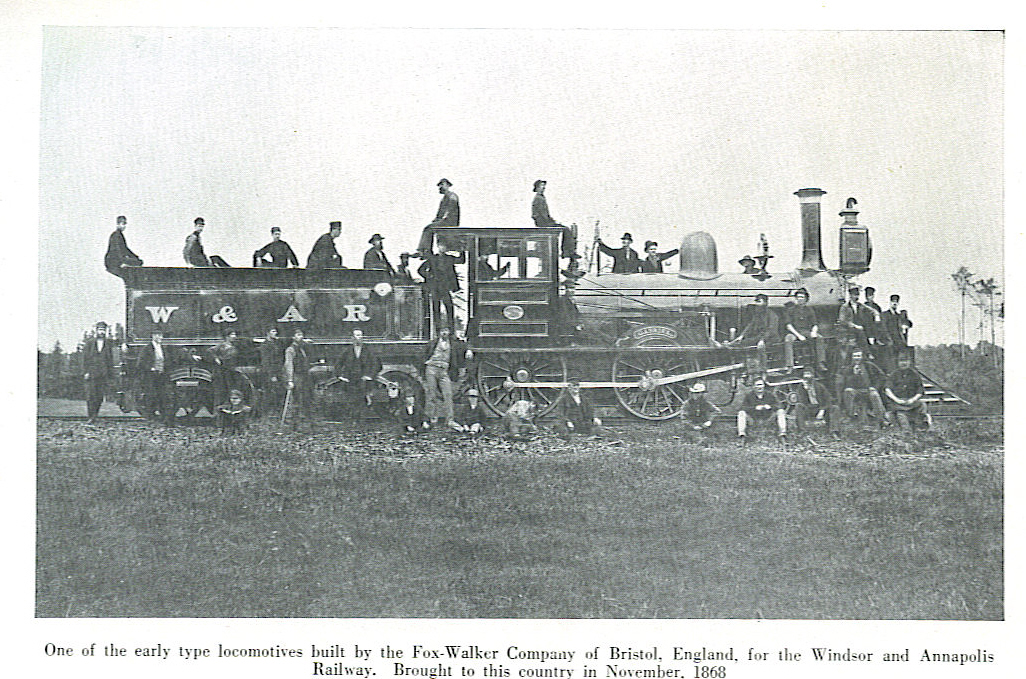Peckett 0-6-0ST Wellingborough Tramway No on:
[Wikipedia]
[Google]
[Amazon]
 Peckett and Sons was a
Peckett and Sons was a
 The company began trading in 1864 at the Atlas Engine Works, St. George, Bristol, as Fox, Walker and Company, building four and six-coupled saddle tank engines for industrial use. They also built stationary engines and pioneered steam tramcars, the first being tested in Bristol in 1877.
Much of their output was exported, mostly , with some , and . In 1878 they produced six gauge trench engines for the
The company began trading in 1864 at the Atlas Engine Works, St. George, Bristol, as Fox, Walker and Company, building four and six-coupled saddle tank engines for industrial use. They also built stationary engines and pioneered steam tramcars, the first being tested in Bristol in 1877.
Much of their output was exported, mostly , with some , and . In 1878 they produced six gauge trench engines for the
 They were taken over by Thomas Peckett in 1880, becoming Peckett and Sons, Atlas Engine Works, Bristol. The company acquired limited liability some years later. By 1900 the two companies had built over 400 locomotives.
The company continued producing a variety of small industrial and shunting engines at their factory located between Fishponds and Kingswood in Bristol. They became specialists in the field, with very precise specifications and standardisation of parts. The largest engine was an built in 1931 for the Christmas Island Phosphate Company. The works were served by a branch line starting just south west of Kingswood junction on the Midland line and ran for about in a generally eastward direction. It also served some collieries in the Speedwell area. The only evidence remaining of this line is a bridge abutment on Whitefield Road.
During the two World Wars, the works were especially busy, but by 1950 trade had largely dried up. Although in 1956 an attempt had been made to enter the diesel-mechanical market, the last steam engine was produced in 1958 and the company was taken over by Reed Crane & Hoist Co Ltd on 23 October 1961, which itself later went into liquidation.
They were taken over by Thomas Peckett in 1880, becoming Peckett and Sons, Atlas Engine Works, Bristol. The company acquired limited liability some years later. By 1900 the two companies had built over 400 locomotives.
The company continued producing a variety of small industrial and shunting engines at their factory located between Fishponds and Kingswood in Bristol. They became specialists in the field, with very precise specifications and standardisation of parts. The largest engine was an built in 1931 for the Christmas Island Phosphate Company. The works were served by a branch line starting just south west of Kingswood junction on the Midland line and ran for about in a generally eastward direction. It also served some collieries in the Speedwell area. The only evidence remaining of this line is a bridge abutment on Whitefield Road.
During the two World Wars, the works were especially busy, but by 1950 trade had largely dried up. Although in 1956 an attempt had been made to enter the diesel-mechanical market, the last steam engine was produced in 1958 and the company was taken over by Reed Crane & Hoist Co Ltd on 23 October 1961, which itself later went into liquidation.
The industrial railway Record, A brief memoir of Peckett & Sons LTDGloucestershire LXXII.SW, Revised: 1938, Published: ca. 1945
OS 6-inch maps showing ''Atlas Locomotive Works''
Peckett & Sons Archive
National Railway Museum {{coord, 51, 28, 13.24, N, 2, 32, 28.9, W, region:GB, display=title Locomotive manufacturers of the United Kingdom Companies established in 1864 Defunct companies based in Bristol 1864 establishments in England Manufacturing companies of England
 Peckett and Sons was a
Peckett and Sons was a locomotive
A locomotive or engine is a rail transport vehicle that provides the Power (physics), motive power for a train. If a locomotive is capable of carrying a payload, it is usually rather referred to as a multiple unit, Motor coach (rail), motor ...
manufacturer at the Atlas Locomotive Works on Deep Pit Road between Fishponds and St. George
Saint George (Greek: Γεώργιος (Geórgios), Latin: Georgius, Arabic: القديس جرجس; died 23 April 303), also George of Lydda, was a Christian who is venerated as a saint in Christianity. According to tradition he was a soldier ...
, Bristol, England.
Fox, Walker and Company
 The company began trading in 1864 at the Atlas Engine Works, St. George, Bristol, as Fox, Walker and Company, building four and six-coupled saddle tank engines for industrial use. They also built stationary engines and pioneered steam tramcars, the first being tested in Bristol in 1877.
Much of their output was exported, mostly , with some , and . In 1878 they produced six gauge trench engines for the
The company began trading in 1864 at the Atlas Engine Works, St. George, Bristol, as Fox, Walker and Company, building four and six-coupled saddle tank engines for industrial use. They also built stationary engines and pioneered steam tramcars, the first being tested in Bristol in 1877.
Much of their output was exported, mostly , with some , and . In 1878 they produced six gauge trench engines for the Royal Engineers
The Corps of Royal Engineers, usually called the Royal Engineers (RE), and commonly known as the ''Sappers'', is a corps of the British Army. It provides military engineering and other technical support to the British Armed Forces and is heade ...
at Chatham using Henry Handyside's steep gradient apparatus. They also produced nine s for the Somerset and Dorset Railway
The Somerset and Dorset Joint Railway, also known as the S&D, SDJR or S&DJR, was an English railway line connecting Bath (in north-east Somerset) and Bournemouth (now in south-east Dorset but then in Hampshire), with a branch from Evercreec ...
.
Peckett and Sons
 They were taken over by Thomas Peckett in 1880, becoming Peckett and Sons, Atlas Engine Works, Bristol. The company acquired limited liability some years later. By 1900 the two companies had built over 400 locomotives.
The company continued producing a variety of small industrial and shunting engines at their factory located between Fishponds and Kingswood in Bristol. They became specialists in the field, with very precise specifications and standardisation of parts. The largest engine was an built in 1931 for the Christmas Island Phosphate Company. The works were served by a branch line starting just south west of Kingswood junction on the Midland line and ran for about in a generally eastward direction. It also served some collieries in the Speedwell area. The only evidence remaining of this line is a bridge abutment on Whitefield Road.
During the two World Wars, the works were especially busy, but by 1950 trade had largely dried up. Although in 1956 an attempt had been made to enter the diesel-mechanical market, the last steam engine was produced in 1958 and the company was taken over by Reed Crane & Hoist Co Ltd on 23 October 1961, which itself later went into liquidation.
They were taken over by Thomas Peckett in 1880, becoming Peckett and Sons, Atlas Engine Works, Bristol. The company acquired limited liability some years later. By 1900 the two companies had built over 400 locomotives.
The company continued producing a variety of small industrial and shunting engines at their factory located between Fishponds and Kingswood in Bristol. They became specialists in the field, with very precise specifications and standardisation of parts. The largest engine was an built in 1931 for the Christmas Island Phosphate Company. The works were served by a branch line starting just south west of Kingswood junction on the Midland line and ran for about in a generally eastward direction. It also served some collieries in the Speedwell area. The only evidence remaining of this line is a bridge abutment on Whitefield Road.
During the two World Wars, the works were especially busy, but by 1950 trade had largely dried up. Although in 1956 an attempt had been made to enter the diesel-mechanical market, the last steam engine was produced in 1958 and the company was taken over by Reed Crane & Hoist Co Ltd on 23 October 1961, which itself later went into liquidation.
Production and preservation
Despite hard work and poor maintenance, the engines were long-lasting. Many Peckett locomotives survive working on today'sheritage railway
A heritage railway or heritage railroad (US usage) is a railway operated as living history to re-create or preserve railway scenes of the past. Heritage railways are often old railway lines preserved in a state depicting a period (or periods) i ...
s around the world.
* The last Peckett steam locomotive built, 2165 of 1958, is preserved at Sandstone Estates, South Africa
* The oldest surviving Fox Walker locomotive is "Karlskoga", an of 1873 and the first locomotive of the Nora Bergslags Railway in Sweden. It was steamed at Nora, Sweden
Nora is a locality and the seat of Nora Municipality, Örebro County, Sweden with 6,526 inhabitants in 2010.
History
Nora received its charter in 1643. The government had requested the inhabitants of both Nora and the adjacent town Lindesberg to m ...
in 1982.
References
* Lowe, J.W., (1989) ''British Steam Locomotive Builders,'' Guild PublishingExternal links
The industrial railway Record, A brief memoir of Peckett & Sons LTD
OS 6-inch maps showing ''Atlas Locomotive Works''
Peckett & Sons Archive
National Railway Museum {{coord, 51, 28, 13.24, N, 2, 32, 28.9, W, region:GB, display=title Locomotive manufacturers of the United Kingdom Companies established in 1864 Defunct companies based in Bristol 1864 establishments in England Manufacturing companies of England